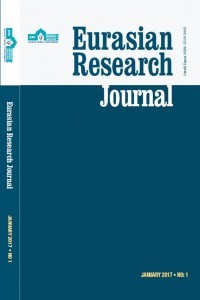POLITICAL INSTABILITY, ECONOMIC AND FINANCIAL CHALLENGES IN THE WESTERN BALKANS IN THE POST-PANDEMIC WORLD
POLITICAL INSTABILITY, ECONOMIC AND FINANCIAL CHALLENGES IN THE WESTERN BALKANS IN THE POST-PANDEMIC WORLD
In the ever challenging post-pandemic world with emerging threats of revisionist global order and growing regional challenges, the Western Balkans region cannot be immune. From threats of destabilization of Bosnia-Herzegovina, the volatile situation in northern Kosovo, and the ongoing Serbia-Kosovo talks to the internal and external threats vis-à-vis Montenegro, the region is facing unprecedented challenges. The freezing of the European Union integration process, the new ideas of “Associate Members” and the new “clusters” methodology have led to enlargement fatigue not only from Brussels but also from regional capitals as well. On the other hand, the growing threats of Russia’s geopolitical ruptures and China’s economic penetration through “debt trap” diplomacy and other mechanisms are making governments and observers in the region increasingly skeptical. This paper tends to explore some of the insights and the economic effects both fiscal and monetary impact they have.
___
- Dabrowski, Marek and Yana Myachenkova (2018). “The (economic) ties that bind: The Western Balkans and the EU”. Bruegel. Retrieved from https://www.bruegel.org/blog-post/economic-ties-bind-western-balkans-and-eu. Accessed: 02.09.2022.
- European Commission (2022). Western Balkans. EU trade relations with the Western Balkans. Facts, figures and latest developments. Retrieved from https://policy.trade.ec.europa.eu/eu-trade-relationships-country-and-region/countriesand-regions/western-balkans_en. Accessed: 03.09.2022.
- European Parliament (2022). The economic and investment plan for the Western Balkans: assessing the possible economic, social and environmental impact of the proposed Flagship projects. 2022. European Parliament. Retrieved from https://www.europarl.europa.eu/RegData/etudes/STUD/2022/702561/EXPO_STU(2022)702561_EN.pdf. Accessed: 01.09.2022.
- European Western Balkans (2021). In response to growing skepticism, officials stress that the future of the Balkans is in the EU. 2021. European Western Balkans. October 27. Retrieved from: https://europeanwesternbalkans.com/2021/10/27/bsf-amid-growing-scepticism-in-the-balkans-officials-stress-that-the-regionsfuture-is-in-the-eu/. Accessed: 28.08.2022.
- Eurostat (2022). Western Balkans-EU - international trade in goods statistics. Retrieved from https://ec.europa.eu/eurostat/statisticsexplained/index.php?title=Western_Balkans-EU_-_international_trade_ in_goods_statistics&oldid=526493#:~:text=The%20EU%20was%20the%20main,(58%20%25)%20in%202021.&text=In%202021%2C%20manufactured%20goods%20made,imports%20from%20the%20Western%20 Balkans. Accessed: 09.09.2022.
- Exit News (2022). Kosovo reiterates opposition to joining the open Balkan. 2022. June 3. Retrieved from: https://exit.al/en/2022/06/03/kosovo-reiteratesopposition-to-joining-open-balkan/. Accessed: 29.08.2022.
- Joseph, Eduard P. (2022). “Open Balkan initiative risks aggravating political problems in the region”. Deutsche Welle. Retrieved from: https://www.dw.com/en/open-balkan-initiative-risks-aggravating-political-problems-in-theregion/a-62834261. Accessed: 04.09.2022.
- Kalemaj, Ilir (2016). “Albania between Western Balkans regionalization and European integration”. Mediterranean Journal of Social Sciences, 7(6): 281-286. Doi: Doi:10.5901/mjss.2016.v7n6p281.
- Karcic, Hamza (2022). Analysis - how open Balkans turned out to be a bad idea. Anadolu Agency (AA). June 20. Retrieved from: https://www.aa.com.tr/en/analysis/analysis-how-open-balkan-may-turn-out-to-be-a-bad-idea/2617864. Accessed: 31.08.2022.
- Meka, Eltion and Ilir Kalemaj (2020). “Critics of democracy: The impact of communist legacy on support for democracy and voting behavior in Albania”. Problems of Post-Communism, 2020: 1-12.
- Observatory of Economic Complexity (2022). Germany-Serbia trade levels. OEC. Retrieved from https://oec.world/en/profile/bilateral-country/deu/partner/srb#:~:text=During%202020%2C%20Serbia%20had%20a,%2C%20and%20Metals%20(%24210M). Accessed: 03.09.2022.
- Ozturk, Talha (2022). US supports open Balkans initiative: Envoy. Anadolu Agency (AA). May 23. Retrieved from: https://www.aa.com.tr/en/europe/ussupports-open-balkans-initiative-envoy/2595552. Accessed: 01.09.2022.
- Qalliu, Bledar (2022). Kosovo, Montenegro Presidents warn of Open Balkan as threat to the region”. Exit.al. May 19. Retrieved from: https://exit.al/en/2022/05/19/kosovo-montenegro-presidents-warn-of-open-balkan-as-threatto-the-region/. Accessed: 25.08.2022.
- Savić-Bojanić, Maja and Ilir Kalemaj (2021). “Art and memory as reconciliation tool? Re-thinking reconciliation strategies in the Western Balkans”. Southeastern Europe, No. 45: 273–290.
- Stojanovic, Milica (2019). “Serbia signs trade deal with Russia’s Eurasian Union”. BalkanInsight. October 25. Retrieved from https://balkaninsight.com/2019/10/25/serbia-signs-trade-deal-with-russias-eurasian-union/. Accessed: 27.08.2022.
- Western Balkans Investment Framework (2022). European Union and the Western Balkans. Western Balkans Investment Framework (WBIF). Retrieved from https://www.wbif.eu/. Accessed: 04.09.2022.
- World Bank (2022). Western Balkans Regular Economic Report: Spring 2022. Retrieved from https://www.worldbank.org/en/region/eca/publication/westernbalkans-regular-economic-report. Accessed: 05.09.2022.
- ISSN: 2519-2442
- Yayın Aralığı: Yılda 4 Sayı
- Başlangıç: 2019
- Yayıncı: Hoca Ahmet Yesevi Uluslararası Türk-Kazak Üniversitesi
